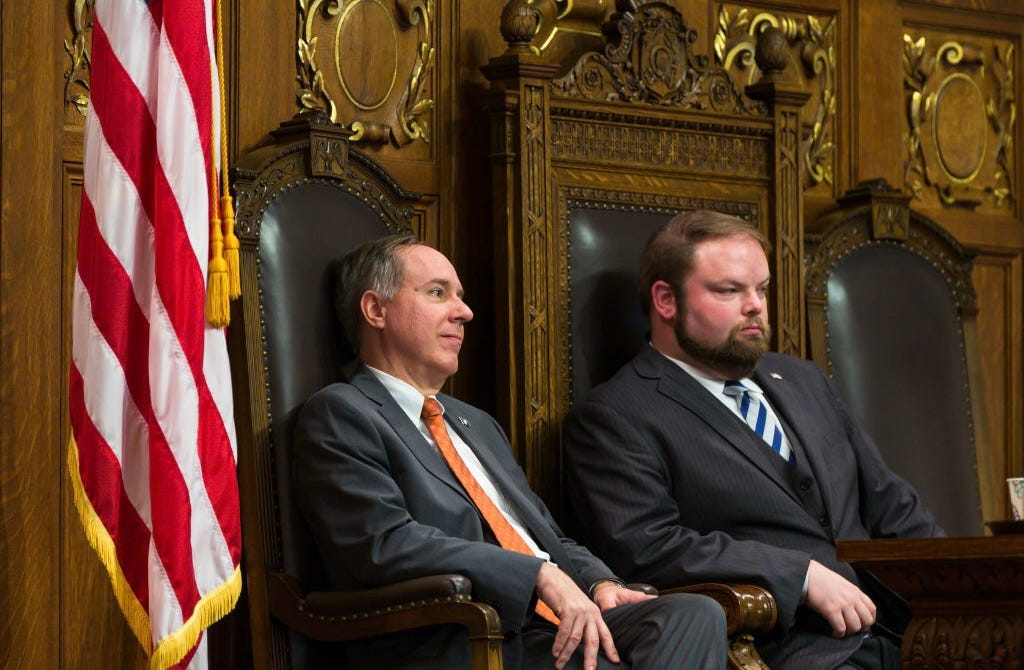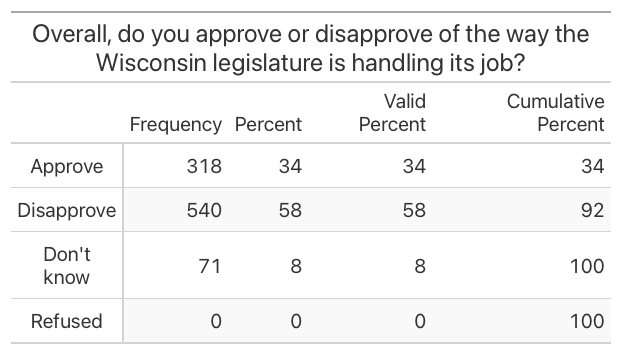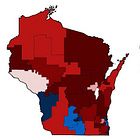Robin Vos and the Wisconsin State Legislature are increasingly, incredibly unpopular
Plus: "Begrudging Biden Voters," Nikki Haley's chances, and more in our breakdown of the new Marquette University Law School Poll.
The Recombobulation Area is a ten-time Milwaukee Press Club award-winning weekly opinion column and online publication written, edited and published by longtime Milwaukee journalist Dan Shafer. Learn more about it here.

The Marquette University Law School Poll is the gold standard of measuring public opinion in Wisconsin, so here at The Recombobulation Area, we take a close look at each new poll. See all of our previous breakdowns here.
PLUS: After each new poll in 2024, we’ll be sitting down with Charles Franklin, executive director of the (top ranked!) Marquette University Law School Poll, to discuss the results. Subscribe to get that podcast delivered to your inbox.
While the nation tunes in to the results of the new Marquette poll to see where Wisconsin stands on Biden vs. Trump in this tipping point state — spoiler: it’s a toss-up! — for those of us living here, the many results examining public opinion of state-level issues and elected officials are of great interest.
In the spotlight of late is the Wisconsin State Legislature, and Robin Vos, and the Wisconsin Supreme Court’s ruling on state legislative redistricting. Taken together, poll results on these issues and entities paint an interesting picture of where Wisconsinites stand on their view of the legislature and its leadership. That picture is one of significant and mounting dissatisfaction.
The new poll results show that the Republican-controlled Wisconsin State Legislature has never been more unpopular, Republican Assembly Speaker Robin Vos has never been more unpopular, and people are generally in favor of the Wisconsin Supreme Court’s decision to strike down the maps for the state Assembly and Senate.
Let’s break this down, starting with the approval ratings for the state legislature.
Only 34% of voters approve of the job the Wisconsin State Legislature is doing, with 58% opposed (net minus-24). Of the three branches of government in the state, this is by far the worst, and the only with a net-negative rating, much less such a sizable one. Gov. Tony Evers has a 51% favorable to 44% unfavorable rating (net plus-6), and the Wisconsin Supreme Court is at 45% favorable to 43% unfavorable (net plus-2).
Within that result, only 5% of voters say they “strongly approve” of the job the state legislature is doing, with 26% saying they “strongly disapprove.”
Among women, the state legislature has just 28% job approval, 60% disapprove. With independents, it’s at 25% approve to 69% disapprove — and only 2% of independents “strongly approve.” Ideologically, only “very conservative” voters have a net-positive view of the legislature, with even “conservative” voters at a net minus-9. The legislature is viewed with significant net-negative numbers in every region of the state and with every age group.
Marquette has been polling the approval rating of the state legislature in this fashion since 2019. This, right now, is the most negative for the legislature those poll results have been. The “disapprove” number had never been higher than 50%, until late last year, when it rose to 57% (with a 40% approval). Being at 34%-58% is quite bad – and comes at quite the moment for this branch of government that’s been under Republican control for more than twelve years.
The trend is similar for the legislature’s most powerful Republican leader, Assembly Speaker Robin Vos. We’ve written a few times about Vos’ remarkably low favorability rating, and how unique it is among all poll results. Once again, that favorability number is in the teens, at just 17% favorable in the statewide poll.
While it’s important to note that this favorability rating shows that more than 40% of voters “haven’t heard enough” to have an opinion of the longtime Assembly Speaker — always a good reminder of how many people are really paying attention to these things — his net-negative is remarkably low, at net minus-22, by far the worst of any state political figure polled.
Vos’ favorability has always been low — he was at 13% favorable to 17% unfavorable in 2019 — but the net negative number seems to rise with every new poll now, from net minus-16 in 2022 to net minus-20 in 2023 to net minus-22 now.
Vos, again, polls poorly with women (12% favorable - 35% unfavorable) and especially poorly now with independents (15% - 45%). He’s a double-digit net-negative with all age groups and education levels, and in every region of the state. His negatives are now even rising among “very conservative” voters — perhaps those who are pushing to recall him in his home district — where he was net plus-18 last fall and just net plus-8 now.
Traditional media in Wisconsin tends to overlook just how poorly Vos performs in these polls, but perhaps there’s impetus here in these results for that to change. This is the worst net favorability rating he's ever had in the Marquette poll, and his highest unfavorable rating ever in the poll. He is a remarkably unpopular politician in the state, and the branch of government he oversees is more unpopular than ever before. The numbers don’t lie.
The spotlight has been brightly on Vos and the legislature in recent months, as redistricting news has been among the biggest political stories in the state. It matters that at this moment, voters have never had a lower opinion of the longtime Assembly Speaker and of the state legislature.
Voters, too, are largely in favor of the Wisconsin Supreme Court’s ruling on redistricting, with 42% in favor, 33% opposed (and 23% with no opinion). It’s not just Milwaukee and Madison either, there are net-positive views of the decision in the Green Bay market and in the northern and western parts of the state, too (only in suburban/exurban Milwaukee is the decision viewed with a net-negative).
With new maps potentially presenting Wisconsin Republicans with their most challenging electoral landscape in the Assembly and Senate in a generation, this is an especially interesting moment for the legislature and its Republican leader to have its worst poll results on record.
Because the polling is clear. Voters in Wisconsin do not like this legislature, and they do not like its longtime leader, Robin Vos.
Whether that results in sweeping change when all 99 Assembly seats and half of the 33 Senate seats are on the ballot remains to be seen. But right now, it certainly seems like change winds are blowing, and that could have profound ramifications for electoral politics in 2024 all across this battleground state.
I’m a firm believer that political power is built from the bottom of the ticket up to the top, and a seismic foundational shift that could come with new maps could reverberate through each legislative race across the state. That, in turn, could have a real impact on who wins Wisconsin’s 10 coveted electoral votes — and with that, the presidency.
Begrudging Biden Voters could be key in tipping point Wisconsin
Win Wisconsin, win the presidency. This state has been the tipping point state in the last two elections, and among the six or seven states that will decide the presidency this year, Wisconsin projects to be right in the middle, to the right of Michigan, Pennsylvania and Nevada, to the left of Arizona, Georgia and North Carolina. No pressure, everyone.
With nine months to go before the election, the head-to-head poll result is as Wisconsin as ever: It’s a dead heat. It’s Trump and Biden, both at 49%. Wisconsin is a toss-up. Same as it ever was.
But beyond that headline result, there are some interesting datapoints under the hood.
For a state as evenly divided as Wisconsin, it’s important to look at where independent voters stand. In this poll, they favor Biden, 49% to 42%. That’s a key result. If Biden can maintain a majority with independents, that would go a long way to helping him win the state.
Other crosstabs in the Trump-Biden matchup are about what you might expect. Biden leads with women, with younger voters, with college-educated voters, with labor union members, and in Milwaukee and Madison. Trump leads with men, with more religious voters, is especially strong in suburban and exurban Milwaukee, and has a slight edge with most older voters. All data worth monitoring, but nothing jumping out as much of a surprise just yet.
One result that does stand out as especially interesting, and potentially key to understanding the underlying decision presented in this race, is the head-to-head Biden vs. Trump, based on Biden’s job approval.
The president’s job approval numbers continue to be underwhelming for an incumbent seeking re-election, at just 41% approve to 58% disapprove. His approval numbers have been a double-digit net-negative in every Marquette poll since early 2022.
Broken down into four categories, Biden’s approval is at 18% strongly approve, 23% somewhat approve, 10% somewhat disapprove, and 48% strongly disapprove. That “strongly disapprove” number is clearly not a great one for the president, but there’s intrigue in the “somewhat disapprove” group. Here’s why:
Among those who “somewhat disapprove” of Biden, Biden actually leads Trump in the head-to-head matchup. We’ll call this group the “Begrudging Biden Voters.”
There’s a lot of evidence suggesting that people are not hugely supportive of either candidate. Franklin said in his presentation that 18% of voters don’t like either Biden or Trump (and you can hear more on that in our podcast). Their favorability numbers are remarkably similar — Biden at 41% favorable to 58% unfavorable; Trump at 40%-58%.
These Begrudging Biden Voters, who might not fully approve of the job he’s doing, but would still vote for him in a head-to-head with Trump, could be the key group to ultimately decide the winner of the presidential election in Wisconsin.
With that, too, is another interesting datapoint relating to enthusiasm in this race. Enthusiasm, overall, is down right now — only about 50% of voters “very” enthusiastic to vote this year, compared to about 70% at this time in 2020 (yes, pre-pandemic).
Those who are most enthusiastic to vote back Trump. Trump supporters have always been motivated to vote for Trump, so this is nothing new. But all other groups polled back Biden by significant margins. Perhaps as the general election starts, the Biden campaign will be able to motivate those less enthusiastic voters. That could be among the biggest challenges of his campaign.
Could the improving economy help Joe Biden’s poll numbers?
There’s been a whole lot of especially positive economic news as of late. Job growth has been tremendous, inflation continues to cool, consumer sentiment is up, unemployment remains low, and GDP growth is among the best in the world.
Public opinion of the economy, however, has been poor in polling for some time. But that’s now showing signs of a shift, too. In last fall’s poll, just 27% of voters rated the economy “excellent” or “good.” That’s up to 38%, just about three months later. The excellent/good rating among independent voters went from just 19% to 38% in the new poll. Views are even better on describing the state of Wisconsin’s economy, where 48% say it is “excellent” or “good.” Again, still not great, but signs of improvement.
Trump’s “handling of the economy” polled reasonably well in Wisconsin during his presidency, a net-positive in almost all polls. In polling of both candidates on the economy, Trump fares far better than Biden on the question of who “would do a better job handling” the economy — 52% for Trump, just 31% for Biden, essentially unchanged from last fall’s poll.
One datapoint that will be interesting to watch over the course of the next nine months is, if the economy continues to improve and produce strong numbers, will polling in Biden’s favor follow? It hasn’t happened yet, but it’s possible the polls could be a lagging indicator of a strong economy.
It’s hard to see how Nikki Haley’s strong head-to-head results against Biden matter
In a head-to-head matchup between Joe Biden and Nikki Haley, the former U.N. Ambassador has a significant lead.
The problem for Haley is that she is so far behind Trump in the primary that it almost certainly does not matter. In Wisconsin, Trump is polling at 64% in the primary, with Haley just at 22%.
Haley’s favorability numbers in Wisconsin are also a net-negative — 36% favorable to 42% unfavorable — and still 22% of voters don’t yet have an opinion of her. That’s not a very good favorability rating, and it’s unclear if her campaign would hold up to the scrutiny of being a frontrunner.
This almost certainly won’t matter, as she’s miles behind Trump — and there’s zero evidence to suggest he would concede if he were to lose, anyway. Good campaign fodder for Haley, I suppose, but nothing that amounts to much else.
Dan Shafer is a journalist from Milwaukee who writes and publishes The Recombobulation Area. He’s also written for The New York Times, The Daily Beast, Heartland Signal, Belt Magazine, WisPolitics, and Milwaukee Record. He previously worked at Seattle Magazine, Seattle Business Magazine, the Milwaukee Business Journal, Milwaukee Magazine, and BizTimes Milwaukee. He’s won 17 Milwaukee Press Club Excellence in Journalism Awards. He’s on Twitter at @DanRShafer.
Subscribe to The Recombobulation newsletter here and follow us on Facebook and Instagram at @therecombobulationarea.
Already subscribe? Get a gift subscription for a friend!
Follow Dan Shafer on Twitter at @DanRShafer.














It’s the third party candidates that will be the worry for Biden. It’s 2016 all over again.